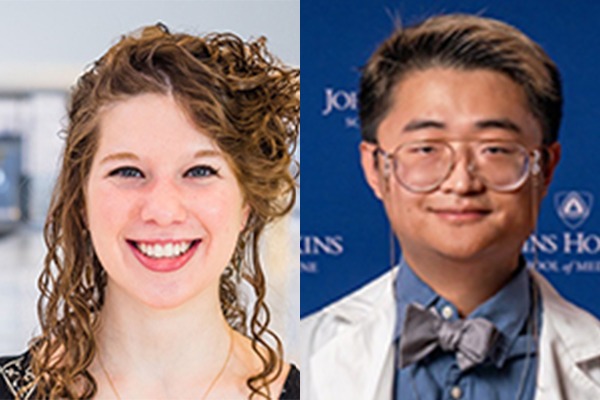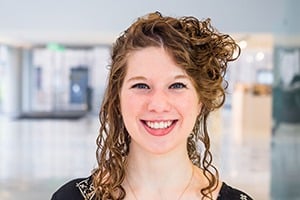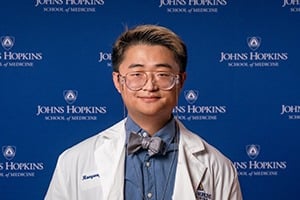The annual Young Investigators’ Day ceremony celebrates the unique contributions of junior researchers and the mentors who helped them excel in their fields. Young Investigators’ Day was established in 1978 to recognize young investigators who are trained at Johns Hopkins University School of Medicine and to provide them with a forum for their work. The awards are intended to recognize research undertaken by applicants while registered as students or postdoctoral fellows at the school of medicine. This year, 13 students and 10 postdocs were selected to receive Young Investigators’ Day prizes.
Two from Hopkins BME recognized at Young Investigators’ Day

Award winners affiliated with Hopkins BME include:

Haley G. Abramson – The Paul Talalay Research Award
I work in the HEPIUS (Holistic Electrical, Ultrasonic and Physiological Interventions Unburdening Those with Spinal Cord Injury) Innovation Lab with Amir Manbachi and Nicholas Theodore, where I created a technology to perform automatic detection of surgical items that may be retained in the brain during neurosurgery. For example, with hundreds of cotton balls used every day, one may accidentally be left behind and lead to potentially life-threatening immunologic responses in the patient. Cotton balls must be manually counted as they are placed in and removed from the brain, but as they soak up blood to clear the surgeon’s field of view, they become visually indistinguishable from the surrounding brain tissue. We discovered that ultrasound can discern these two materials when our own eyes cannot. I developed a deep learning algorithm with 99% accuracy, sensitivity and specificity that identifies cotton balls and other surgical items in ultrasound images of the brain. This technology is paired with a smartphone application that can be used intraoperatively without saving patient health information.

Haoyang Mi – The Mette Strand Research Award
My research projects focus on the quantitative characterization of the tumor microenvironment (TME) to better understand the mechanism of cancer progression and anti-tumor immunity. Specifically, I am fascinated by the crosstalk of different cell populations within the TME in the spatial domain. Using multiplexed tissue imaging and image processing techniques, I was able to distinguish single-cell identities and their spatial locations from pathological samples of various cancer types. Using a combination of spatial statistics and machine learning, I was able to distill key spatial features that can be used to predict cancer patients’ likelihood of response to therapy and survival term. For example, my approaches revealed that the proximity of a rare subtype of myeloid — CD163– Arginase+ macrophage — to helper T cell favors improved anti-tumor immunity in hepatocellular carcinoma. Remarkably, the immunosuppressive role of myeloid cells was also observed in pancreatic cancer and non-small cell lung cancer. These findings suggest novel therapeutic candidates in immune-oncology research may benefit the design of future clinical trials and facilitate precision medicine. I conducted my research in Aleksander Popel’s lab. Our lab is devoted to applying systems biology approaches to solve problems related to cancer and ocular and cardiovascular diseases.
